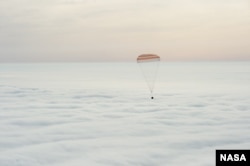Astronaut Scott Kelly, who returned March 1 from nearly a year aboard the International Space Station, is now just over 5 centimeters taller than his identical twin brother Mark.
That was a preliminary finding of the effects of long-term exposure to zero gravity on the human body.
“Our studies will provide important data on how the space environment impacts the human body at the molecular level so that NASA can identify risk factors and countermeasures for possible health issues induced by prolonged space travel, such as a mission to Mars,” said psychiatry professor Brinda Rana, principal investigator on the University of California San Diego School of Medicine team which will participate in the study of the Kelly twins.
Astronauts often get taller in space because the discs in the human spine get slightly compressed due to gravity on earth, according to NBC News.
Kelly’s mission was, in part, a chance for NASA to see how astronauts would fare on a mission to Mars, which would probably last about a year.
Some physical issues long-term space travelers could face are brittle bones, weakened muscles, puffiness in the face and legs, a decrease in heart size, balance issues and a higher risk of cancer, according to NBC.
But Kelly reportedly said he “feels pretty good” after returning to Earth.
Before his mission, NASA said Kelly would be exposed to the same amount of radiation as flying from New York to Los Angeles 5,250 times.
The agency said that during his time in space, about two liters of fluids shifted from Kelly’s legs toward his head.
“Our bodies are adapted to a 1g environment in which gravity pulls the blood toward the feet,” Rana said. “In space, with nearly zero gravity, the blood and other fluids in the body shift upwards toward the upper body around the heart, the neck and the head. This fluid shift may cause changes in brain pressure and vision, which have been observed in some astronauts.”
Kelly tried to maintain some level of fitness while on the space station, with NASA predicting he would exercise up to 700 hours.
Scott and his brother will now be subjects of a year-long project to compare the health and genetics of the two twins.






